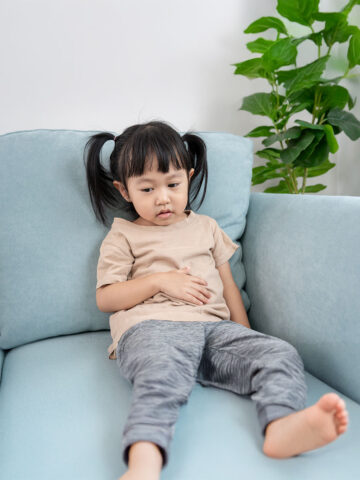Stopping a bleeding nose
Though messy, inconvenient and sometimes scary, most bleeding noses will stop on their own and can be treated at home. Here is what parents or caregivers should do, says Dr. Reshmi Basu, a pediatrician in the CHOC Primary Care Network:
- Stay calm and reassure the child that they are safe.
- Ask the child to sit upright in a chair or on the caregivers’ lap.
- Tilt the child’s head slightly forward.
- Do not ask the child to lean back. This may cause blood to flow down the back of the throat, which tastes bad and may cause gagging, coughing or vomiting.
- Gently pinch the soft part of the child’s nose, just below the bony ridge, with a tissue or clean washcloth.
- Keep pressure on the nose for about 10 minutes. Stopping too soon may start bleeding again.
- After the bleeding stops, ask the child to relax for a while. Discourage them from blowing, picking or rubbing their nose, or engaging in any rough play.
What are the types of nosebleeds
An anterior nosebleed is the most common and comes from the front of the nose, says Dr. Basu. Capillaries, or very small blood vessels, inside the nose may break and bleed, causing this type of nosebleed.
Rarer in children, a posterior nosebleed comes from the deepest part of the nose. Blood flows down the back of the throat even if the person is sitting or standing. These are more common in older adults, those with high blood pressure, and people who have had nose or face injuries.
What are the causes of nosebleeds
Here are some common causes of nosebleeds:
- Dry air causes most anterior nosebleeds. A dry climate or heated indoor air irritates and dries out nasal membranes. This causes crusts that may itch, then bleed when scratched or picked. The common cold also can irritate the lining of the nose, with bleeding following repeated nose-blowing, Dr. Basu says.
- Allergies and their associated medications can also be culprits. These medications control itchy, runny or stuffy noses, but they can also dry out nasal membranes, which can lead to nosebleeds.
- Injuries or blows to the nose can cause bleeding, but most aren’t a serious problem. However, if your child’s facial injury causes a bloody nose and bleeding doesn’t stop after 10 minutes or you have other concerns about the injury, seek medical care right away.
When to call the doctor about nosebleeds
Nosebleeds are common and generally resolve themselves, but these are some instances when Dr. Basu says a call to the pediatrician is necessary:
- The child has frequent bleeding noses.
- They may have put something in their nose.
- The child tends to bruise easily.
- They have heavy bleeding from minor wounds or bleeding from another place, such as the gums.
- The child recently started taking new medicine.
Dr. Basu says urgent or emergency care is needed if the bleeding is heavy and the child also feels dizzy or weak; the bleeding follows a fall or blow to the head; or the bleeding doesn’t stop after two attempts at applying pressure for 10 minutes.
What a pediatrician might do for frequent bloody nose in child
Frequent nose bleeds are often easily treated by a pediatrician, says Dr. Basu. Many times, tiny blood vessels inside the nose are irritated and don’t heal. This happens more often in kids with ongoing allergies or who get a lot of colds. A pediatrician can be helpful in these cases.
For children whose nose bleeds aren’t due to allergies, irritated blood vessels or a sinus infection, a pediatrician will ask questions about the child’s medical history and that of their family, and possibly order tests to find the cause of the bleeding, says Dr. Basu. Rarely, a bleeding disorder or abnormally formed blood vessels could be the cause of the frequent nosebleeds.
How to prevent nosebleeds in kids
Here are some things Dr. Basu suggests you do to head off nosebleeds in the first place:
- Keep your child’s nails short to prevent injuries from nose-picking.
- Keep the inside of your child’s nose moist with saline (saltwater) nasal spray or gel, or dab petroleum jelly or antibiotic ointment gently around the opening of the nostrils.
- Run a cool-mist humidifier (or vaporizer) in bedrooms if the air in your home is dry. Keep the machine clean to prevent mildew buildup.
- Ensure children wear protective athletic equipment during sports or other activities that could cause a nose injury.
For more health and wellness resources from the pediatric experts at CHOC, sign up for the Kids Health newsletter.
Find a CHOC Primary Care Pediatrician
From babies to teens, pediatricians from CHOC’s Primary Care Network partner with parents to offer immunizations, sick visits, sports physicals and more.





